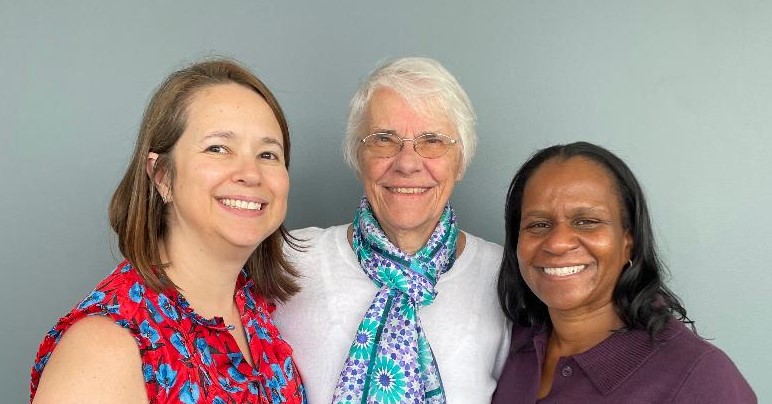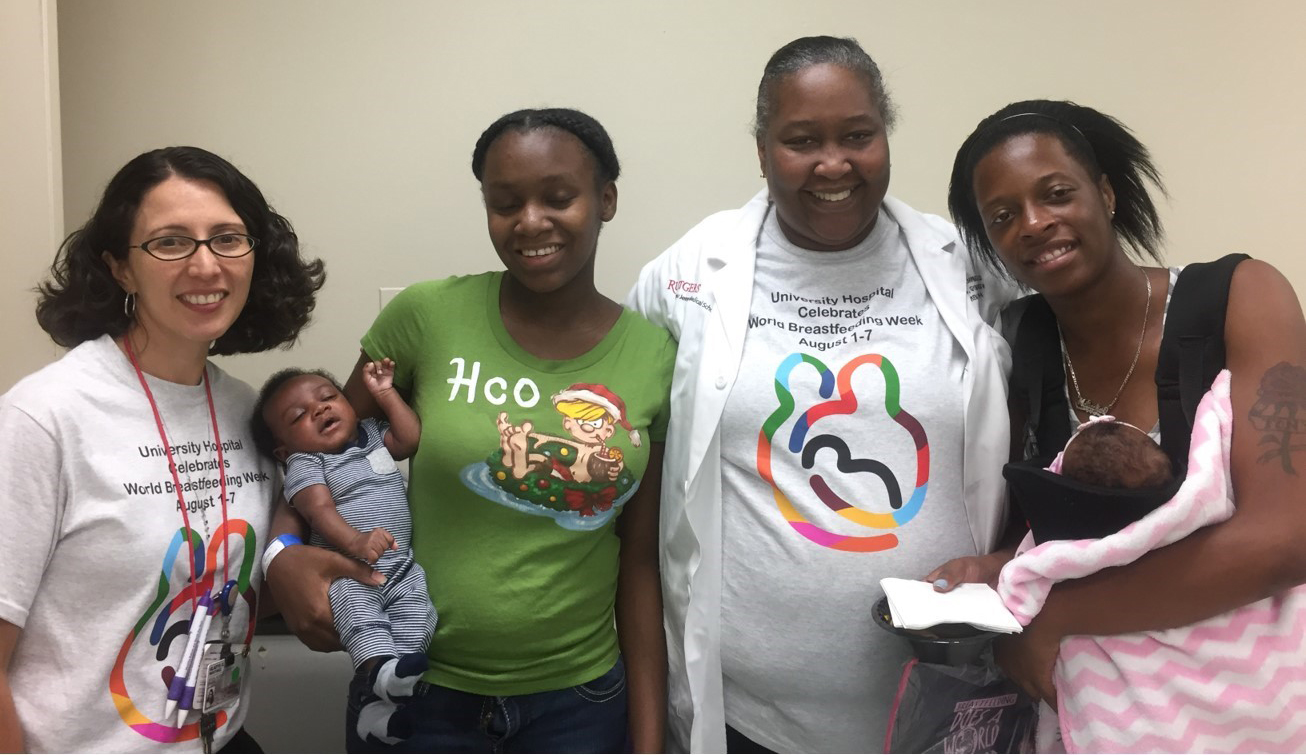👋 Loneliness is an epidemic among parents, whether their families and friends are thousands of miles away or right next door. For expectant moms and new parents, loneliness brings significant health consequences, including higher risks for postpartum depression and cardiovascular problems. For new moms in particular, connections are key — from a support system to help with the logistics of preparing or caring for a new baby to a simple listening ear. We all need community.
This issue takes a closer look at CenteringPregnancy, a game-changing approach to maternal care where expectant women receive their prenatal care in a group setting. They receive excellent, quality care and build a mutually beneficial community of moms. By helping to reduce stress and overcome isolation, CenteringPregnancy is a boost for maternal and infant health.
CenteringPregnancy and the complementary pediatric concept CenteringParenting were among the first 2-generation investments the Burke Foundation made when we directed our focus to the earliest years. We’ve gone on to support 25 Centering sites in New Jersey so far, with more to come. To better understand Centering, we spoke with Sharon Schindler Rising, one of its founders. Look for that interview below.
As you dig deeper into Centering, I hope you’ll be as enthusiastic as we are about this exciting option for new parents.
Atiya Weiss
Executive Director, the Burke Foundation
1 big thing: Group care for pregnant women and families

Traditionally, prenatal care is delivered by a healthcare provider to one pregnant woman at a time — sometimes including a partner or friend. Appointments typically are as short as 15 minutes, with little time for questions, often leaving patients without important information about their health or other concerns.
For women of color in particular, this brevity can exacerbate the disconnect between provider and patient, leaving them at risk for complications, contributing to the disturbing maternal health disparities plaguing the U.S.
The power of group care: CenteringPregnancy alters the dynamic. Instead of 1-on-1 care in short appointments, 8-12 women meet in small groups for 1.5-2 hours. In line with American College of Obstetricians and Gynecologists guidelines, each patient weighs herself, takes her own blood pressure, and sees the doctor, nurse midwife, or nurse practitioner for a brief check-up.
The results are amazing. Studies show:
✅ Increased participation in post-partum visits
✅ Fewer preterm births and low birth-weight babies
✅ Increases in exclusive breastfeeding
✅ Lower cost of care
Growing the village of care: With more time and a supportive environment for raising questions about pregnancy and childbirth, women are less likely to avoid prenatal care visits. They show up for each other, inside and outside the clinic, forming a crucial support network.
Group care works for pediatrics, too. CenteringParenting takes the group healthcare model to pediatrics, bringing parents into a group setting with the healthcare provider. Children are weighed and measured then parents share their questions and concerns, learn about developmental milestones, and connect with and learn from other parents in their community.
A better experience for providers: Delivered in a range of medical practices – from private practices to clinics to hospital settings – Centering offers distinct benefits to clinicians. Healthcare providers bill for services as they would for an individual visit and deliver information to more patients at once, since many common questions are answered in the group session. Providers can focus on individual patient concerns during the 1-on-1 private time that is part of each session. These deeper conversations can address medical and health-related social needs more effectively and connect patients to additional support or resources.
What now? Let’s make Centering a household word. It’s a better way to deliver care to pregnant women. So it’s time to make it a standard of care through training, clinician exposure, and increased awareness.
2. Origins of Centering: Interview with Sharon Schindler Rising

Sharon Schindler Rising, certified nurse-midwife, founder of the Centering Healthcare Institute and the nonprofit Group Care Global, was inspired to create Centering to improve maternal and infant health when she was a graduate nursing student at Yale in the 60s.
During her studies, Sharon spent time in a waiting room at a New Haven clinic, listening to the concerns of expectant mothers. The dynamic conversations and the women’s support for each other planted the seed for a new approach to prenatal care. Following is a condensed version of our conversation. Click here for the full interview.
Why did you want to spend time in the prenatal clinic waiting room during your studies?
I had decided that didactic education doesn’t work terribly well, and that there is so much to be gained by truly listening to people. I was a graduate nursing student, hadn’t had a baby yet, and thought it would be instructional for me to listen to what women were experiencing at home. How was their environment? What were their challenges? I also recognized that their medical visits with clinicians were short and didn’t really support in-depth discussions.
Little did I know that this was going to be a re-occurring theme for me! When I worked in Minnesota with the Childbearing Childrearing Center, I had another opportunity to think about what prenatal care should look like. We had the freedom to design a different look to care and I thought back to the New Haven clinic and how nice it was for me and the pregnant women to sit together in a circle and talk.
My own past midwifery experience also influenced me. As I cared for so many pregnant people, I would think about how there was so much more to prenatal care than what we fondly call “the belly check.” I would have similar discussions with patients all day and realized one person’s question is another person’s question.
What’s it like to be in a Centering session?
Starting around 12 to 16 weeks of their pregnancy, expectant mothers come directly to the group space, where there’s music playing. At the first session they’re shown how to take their blood pressure and encouraged to check their weight. Participants keep track of their own health data.
In a corner of the room, there’s a place where the actual 3-minute health assessment is done, usually on something low to the floor like a mat or cot. The “belly assessment” of listening to the heartbeat and determining that the baby is growing doesn’t take much time at all. The focus is on making sure things are going fine with this person, including looking briefly at the health data that she herself has collected and that is found in her chart. You can see how the participant is starting to understand what it means when her blood pressure is different from time to time or how she is doing with her weight.
When the assessments are done, we gather in a circle for an opening discussion. After our opening, where everyone’s voice is heard, a facilitator might begin by saying, “Roberta, you had a question that you put up on the board. Would you share a little more with us about that?” And she would typically share. I’d listen and make sure that it’s clear what the issue is and then say, “I’m guessing this may be something that some of the rest of you also are experiencing. Is that true?”
There’s this very rich discussion that often happens. People speak up with things that have worked for them.
Why are some providers reluctant to incorporate Centering in their practices?
It requires a lot of change, and people and systems don’t like change. Just think about all it entails. For example, schedules need to be different. In a group, it’s the same clinical provider for 10 sessions, because that consistency creates stability in the group and it’s important for the development of trust.
For me and for the many providers who participate in Centering, being able to sit in the group and listen and really get to know the 10 to 12 participants over time, is incredible. We hear midwives and nurses say, “This is why I wanted to do this work. This is the kind of care I want to give.”
What’s happening globally with Centering? What kind of reception has it received?
We formed Group Care Global in 2017 to respond to the international interest. Since that time, we worked with the Chinese Midwifery Association. Their goal has been to get groups going in every one of their provinces.
We’ve been part of what we call Centering-Based Group Care in Malawi and have trained in-country trainers who’ve taken over and now are in the process of moving forward with the Ministry of Health. The goal in every country is to get the Ministry of Health on board and to get their support. We started working in the Netherlands many years ago. They just had their 11th anniversary and finally are getting reimbursement. We’ve been working as well in Ghana, South Africa, and Zanzibar.
This is a model that works for any person who is pregnant. It doesn’t matter. Women in Malawi wrote songs and they end every group in circles singing, “This is wonderful. We’re together. We’re a group when we are in Centering together.”
1 smile to go: Centering successes at University Hospital in Newark

One of the Burke Foundation’s success stories with CenteringPregnancy can be found at University Hospital in Newark, NJ. Since the site began accepting patients in 2019, It’s served more than 200 women and is hiring 2 advanced practice nurses to lead additional CenteringPregnancy groups.
“We’ve had patients come back to participate more than once, or who refer their sisters and other family members. That’s a testament to the program’s value,” says Dr. Damali Campbell, a physician in Obstetrics and Gynecology and Addiction Medicine at University Hospital and an associate professor at Rutgers New Jersey Medical School.
Campbell is the lead physician for CenteringPregnancy and is a longtime advocate for Centering for both providers and patients. “I know it has allowed me to get to know patients on a more intimate level,” she says.
To extend the continuum of care to include group well-child visits, University Hospital added CenteringParenting in late 2023, bringing together families with newborns for their pediatric care.
The roundup
Leading the way: 🎉 Congratulations to our partners at Centering Healthcare Institute for receiving a $7.6 million investment from The Studio @ Blue Meridian to support a 3-year strategic plan toward scaling Centering in 5 states, including New Jersey. ⭐
Forging a path: The Geraldine R. Dodge Foundation is hiring a president and CEO to lead the alignment of the Foundation’s investments and operations with its new strategic framework.
Developing leaders: The Bank Street Education Center is recruiting for the third cohort of its Early Childhood Policy Fellowship to start in January 2025. Applications close November 15. Learn more and apply.
